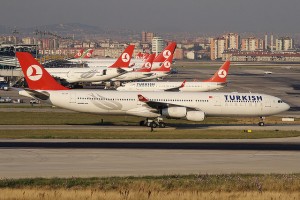
A nice Turkish Airlines Airbus A340 up front, lots of other Turkish planes in the background.
The argument for “passengers of size” has been going on for quite some time now. Now Turkish Airlines is looking to add “flight attendants of size” into the mix. 28 flight attendants have been put on unpaid leave to shape up or be reassigned.
Izzet Levi, head of a cabin attendants’ association, and one of those trying to lose weight, told the Haber Turk newspaper he must drop 22 pounds or he will get re-assigned.
This is a tricky situation. With larger passengers, it is easy just to have them purchase a second seat, but flight attendants need to be able to safely get up and down the aisle and help passengers get off the aircraft in case of an emergency.
It is easier with passengers to tell when they have to buy a second seat. If you can’t put your seatbelt on or put down the armrests, there is a good chance you will have to buy the seat next to you, but with flight attendants, it is not as easy.
Source: AOL Travel Image: Baris Karakaya

The good old airline spork.
Weight equals money and when a fully loaded Airbus A380 can weigh over a million pounds, airlines don’t want to be adding any unnecessary weight. The airline industry has become very creative with adding new fees to bring in additional revenue, but they are also looking at creative ways to lessen weight and save money.
Northwest Airlines (err, I guess Delta) is now cutting spoons on their flights to help save weight. Sure one little spoon might not seem to make a big difference, but a Northwest Boeing 747-400 holds more than 400 people — that’s a lot of spoons (why don’t they just bring back the spork?)
They aren’t the only airline considering utensil overhaul. Japan Airlines has decreased the size of their cutlery (which not only saves money in weight, but for purchase price of the actual product). Other airlines are cleaning their planes more (dust = weight), not supplying magazines and carrying less water on board.
I am sure this concept will catch on. From cutting pillows, to the type of fabric being used in seats, to having less gadgets (boo), to maybe even someday accounting for passengers’ weights (hopefully not, but RyanAir might be crazy enough), the airlines will probably continue to look for cost-cutting measures, especially as they move toward better fuel-efficiency.
Source: Seattle PI Image: Ethan Hurd

